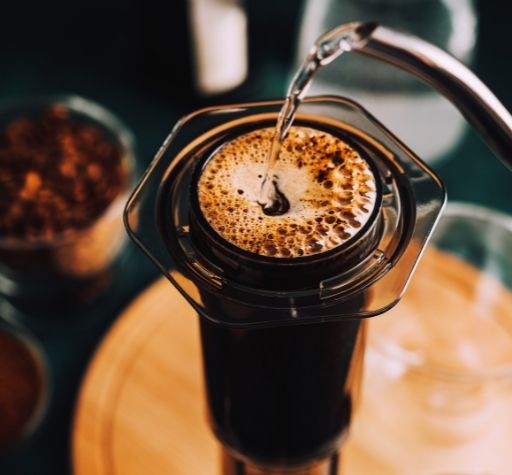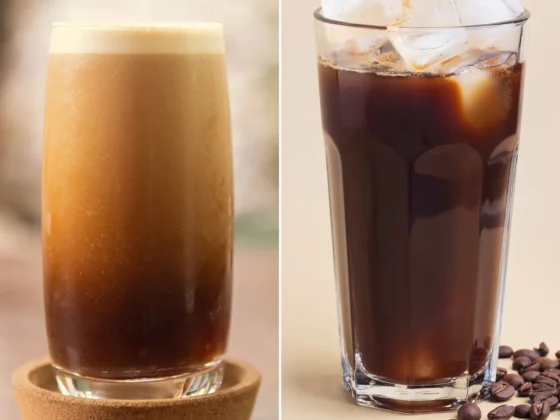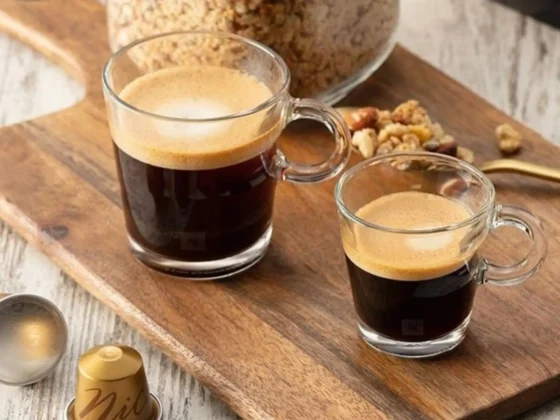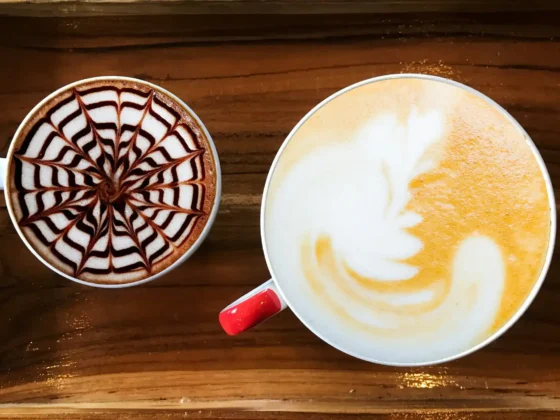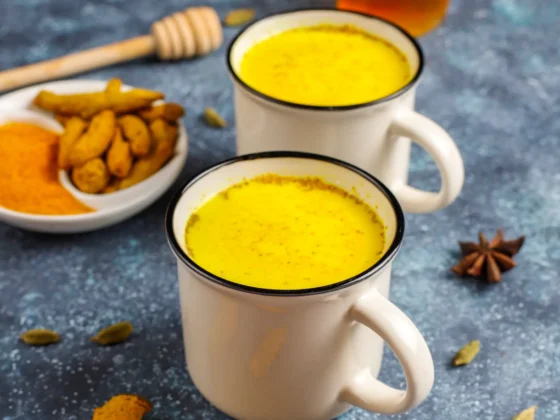While coffee is undoubtedly the more popular drink of the two, Matcha seems to be on the tip of everyone’s tongue lately. Anyone who’s tasted the stuff is raving about the green powder, praising its smooth taste and miraculous remedial attributes.
Interestingly, coffee and Matcha have similar health benefits, making us question if we should put down our cups of java and pick up Matcha bowls instead. While you might not have to go that far – I know I won’t – it would be pertinent to compare the two drinks to see how they measure up.
In this article about Matcha vs. Coffee, we’ll dive into both drinks, uncovering what makes them such sensational liquids. We’ll explore caffeine content, acidity levels, and health benefits to give us a better, more educated perspective on these two beverages.
What is Coffee?
Made from a ripe little fruit that grows on the coffee plant, coffee is a brewed liquid consumed worldwide. Coffea plants thrive around the world’s equatorial zone on what we call the “coffee belt.” Though hundreds of plants make up the Coffea genus, only two are used for making coffee: Coffea arabica and Coffea canephora (aka Robusta).
Arabica coffee beans are soft-tasting and offer a complex range of flavors, while Robusta beans are commonly known for their bitter, more simple characteristics. No wonder Arabica coffee beans are more popular than Robusta.
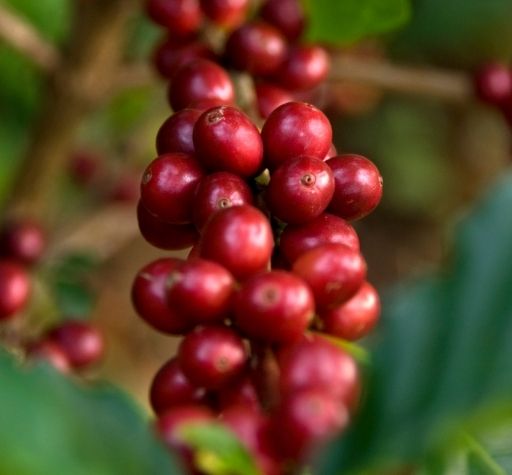
Coffee cherries are harvested (often by hand), dried, processed, and milled until only seeds or “green beans” remain. The green beans are shipped to roasteries worldwide, where roasters determine which roasting method puts forward the beans’ best characteristics.
Every step of the coffee process is exceptionally intricate, demanding expert knowledge to produce quality beans. Indeed, a lot goes into making a simple cup of coffee. So, as you sip your caffeine nectar, take in the amount of work that went into producing those tiny little beans.
What is Matcha?
What was once a Chinese tradition became entirely Japanese in the 15th century after a Zen monk studying in China returned to The Land of the Rising Sun with a technique that would become the backbone of Japanese tea culture. It even became popular with the Samurai class, elevating it to an art form that could teach focus, concentration, timing, and patience.
Matcha is made using the leaves of the evergreen plant Camellia sinensis, the same plant we use to make green, black, oolong, white, and Pu-erh tea. Yes, all teas are made from the same plant. Sorry, there aren’t black tea or oolong plants, just different cultivars of Camellia sinensis.
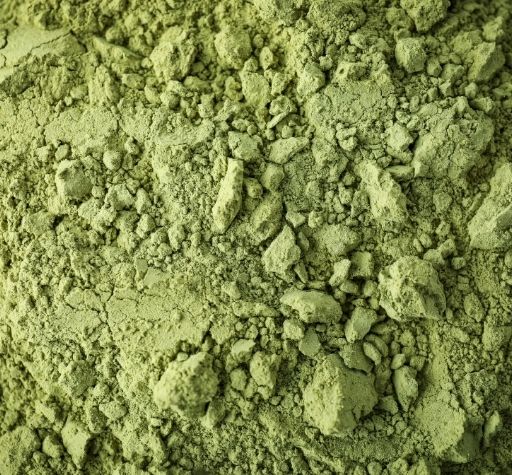
Unlike other teas, which are steeped in hot water to extract the leaves’ flavor, Matcha is made by beating tea leaves into a fine powder that’s whisked into hot water, becoming one with the liquid. Matcha’s most striking characteristic is its bright green appearance. It results from shielding the plant from sunlight for the last few weeks before harvest, forcing the plant to produce more chlorophyll.
Does Matcha Have Caffeine?
In one word: yes. Matcha, just like other tea, has caffeine. In fact, Matcha has more caffeine than other teas. That’s because when you drink Matcha, you’re consuming the leaves entirely, while when you drink traditional tea, you’re only drinking the tea leaves’ “broth.” It’s like boiling carrots in water; you get tons of nutrients and antioxidants when you eat the carrots, but a lot less if you toss the carrots and simply drink the water.
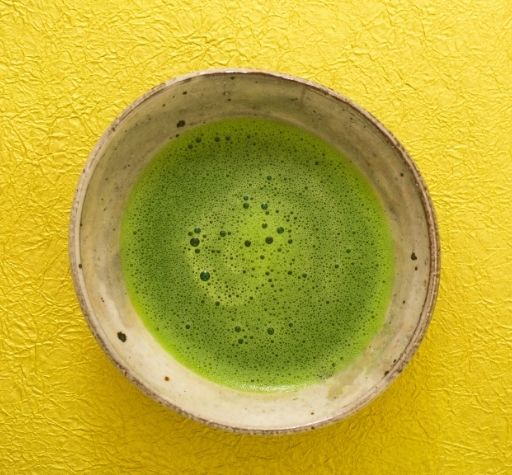
An 8 oz cup (that’s a short cup at Starbucks) of Matcha contains 64 mg of caffeine – that’s as much as one shot of espresso. A cup of green tea has only 40 mg, while the same amount of brewed coffee contains 100 mg of caffeine. (1)
|
8 oz. cup |
Caffeine Content |
|
White Tea |
22 mg |
|
Green Tea |
40 mg |
|
Oolong |
46 mg |
|
Black Tea |
55 mg |
|
Matcha |
64 mg |
|
Brewed Coffee |
100 mg |
* note that these figures vary depending on infusion time and brewing method.
While Matcha has a considerable amount of caffeine, it doesn’t deliver the “jolt” that coffee is known for. That’s likely due to Matcha’s high content of L-theanine, a stress-reducing, mind-calming amino acid. If coffee is like a 100-meter sprinter, Matcha surely is a 400-meter all-star.
Decaf Matcha?
If you feel like having something less caffeinated than coffee, Matcha may be a good option. But, if Matcha still contains too much caffeine for you, there is an alternative: decaf Matcha.
While finding decaf Matcha may not be as easy as finding decaf coffee, the option does exist. However, the decaffeination process will remove some of the most nutritional elements found in the non-decaf version.
Is Matcha More Acidic Than Coffee?
To measure acidity levels, we use the pH scale. The scale ranges from 0 to 14 – the most acidic being 0 and the most alkaline being 14.
Matcha has a pH level of 9, while coffee has an average of 4.85 – 5.10 pH levels. The acidity levels of coffee can vary depending on the brewing method and the type of roast. For example, a light roast coffee is more acidic than a dark roast. Still, coffee is much more acidic than Matcha. (2)(3)
How to Prepare Matcha?
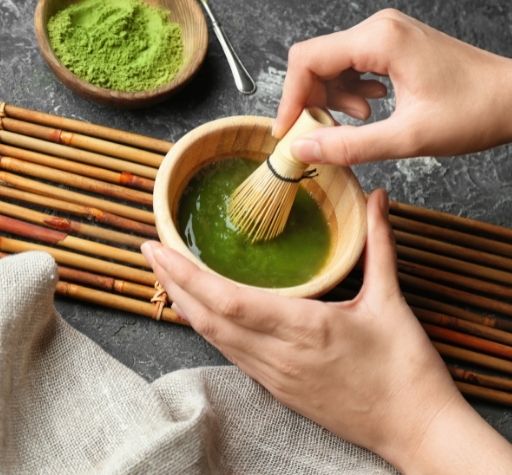
Even though ancient Samurais would disagree, making a bowl of Matcha isn’t too tricky. All you need is a bowl and a spoon to make it happen, but if you’re serious about making traditional Matcha, you’ll need:
- Chawan (matcha bowl)
- Chasen (bamboo whisk)
- Chashaku (bamboo scoop)
- Furui (sifter)
- Chasen Kusenaoshi (whisk holder)
- Chakin (cloth)
To make an 8oz cup of Matcha: begin by sifting half or a full teaspoon of Matcha powder into your drinking bowl. Pour a small amount of hot (not boiling) water into your bowl and whisk the mixture from side to side (not in a circular motion) until you have a foamy paste. Top it with the rest of the water, whisk it again from side to side, and voila, your cup of Matcha is ready to drink.
Health Benefits of Matcha
In recent years, a significant number of scientists have conducted a fair share of experiments on Matcha and how it interacts with our bodies and mind. (4)
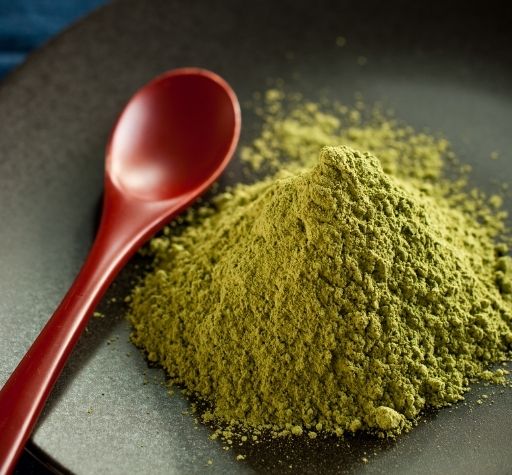
Matcha is an excellent source of antioxidants. They combat free radicals and prevent oxidative stress, a process that can lead to cell and/or tissue damage in the human body.
Matcha can help your liver and kidneys. It can reduce enzyme levels, protecting you from liver and kidney damage.
Matcha can boost your brain functions. The high contents of caffeine and L-theanine can contribute to healthy brain functions and improve attention span, reaction time, and memory.
Matcha has anti-cancer properties. The antioxidant epigallocatechin-3 (EGCG) has shown promise in decreasing the size of tumors.
Matcha can promote heart health. It can lower blood pressure and reduce levels of LDL cholesterol and triglycerides.
Health Benefits of Coffee
Not so long ago, coffee was looked down upon as a wicked drink that could ruin your overall health and sanity. Thankfully, scientists started researching the stuff and found out that coffee is the opposite of what we believed. (5)

Coffee will boost your brain’s energy level. Caffeine is understood to increase the firing of neurons, resulting in better reaction time and general mental functions.
Coffee will improve your mood. It increases your dopamine levels, making you happier with every sip.
Coffee can help you get in shape. Found in most fat-burning supplements, caffeine can boost your metabolism, helping you burn some extra fat when you exercise.
Coffee is a great source of essential nutrients. Riboflavin, Pantothenic acid, Manganese, Potassium, and Magnesium are examples of a few vitamins contained in coffee.
Coffee can lower the risks of type 2 diabetes. Cafestol potentially increases insulin secretion and improves insulin sensitivity. If you’d like to learn more, be sure to read our article on the health benefits of coffee
Matcha vs. Coffee: Pros and Cons
Both drinks have undeniable health benefits, but it should be no surprise that they also have some drawbacks, especially when consumed in high quantities.
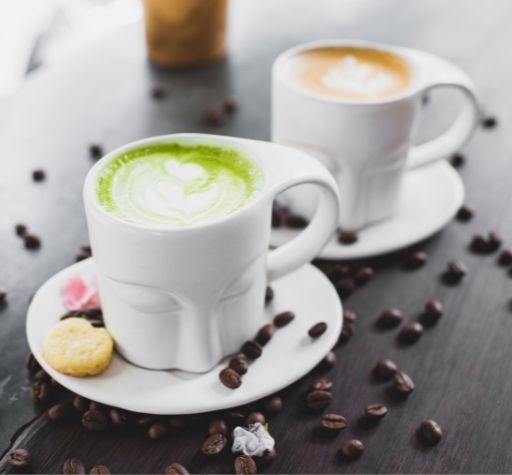
Coffee’s high caffeine content can disrupt your sleep, make you jittery, upset your stomach, and in more severe cases, potentially increase cardiac risks. Caffeine is considered addictive, so try your best to control your daily coffee intake. (6)
Like coffee, Matcha contains a significant amount of caffeine, so the risks associated with coffee can be applied to Matcha. The green powder is also pricier than coffee.
Remember that any good thing can become dangerous for your health if you consume an excessive amount of it. Listen to your body and monitor how it reacts when you consume more or less of the stuff.
Can I Mix Matcha with Coffee?
Now that we’ve looked at both drinks closely, you’re probably wondering what would happen if you mixed coffee with Matcha. How would it taste? And what health benefits or drawbacks can you expect?
Yes, you ABSOLUTELY can blend coffee with Matcha. If you haven’t seen it on your local coffee shop’s menu yet, Matcha Coffee Latte is becoming extremely popular worldwide. Served hot or iced, it’s made by combining a single or double shot of espresso with Matcha and topped with your favorite milk.
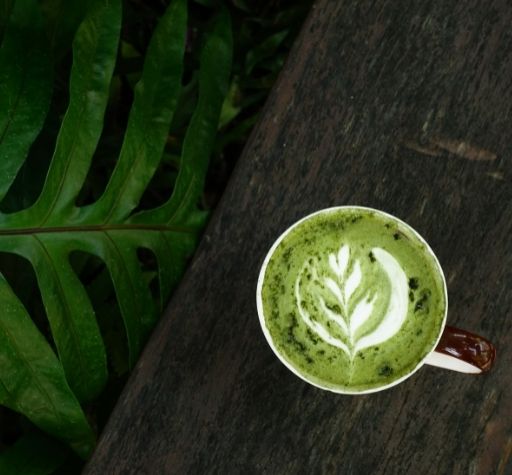
While taste is subjective to personal preference, I think it’s a fantastic drink. It’s simply brilliant when you find the right balance of coffee to Matcha ratio – not too sweet, bitter, or acidic, the flavors just dance in your mouth, awakening your senses with every sip.
By mixing coffee with Matcha, you can expect all the health benefits listed in the above sections but amplified. That said, the drawbacks would also be enhanced. So, you can expect a significantly higher amount of caffeine, increasing the prospect of getting the jitters if you’re caffeine sensitive. Just have a cup and see how it makes you feel before indulging in another!
Conclusion
While Matcha and coffee differ in more ways than one, they share some striking similarities. Both have fascinating histories that are deeply rooted in our tradition and culture. They are more than drinks: they are social tools that bring people together to discuss, bond and share special moments.

Today, research provides evidence that coffee and Matcha are beneficial for our health, comforting us in our drinks of choice. So, whether you’re a coffee-lover, a Matcha sipper, or if you like both, drink up; it’s the stuff of life!
About the Author

Alex Rezgui – A spunky French-born American, Alex has embraced the nomadic lifestyle for over a decade. He’s a freelance writer who likes to move to a funky beat. Coffee is his fuel, passion his motivator, and rhythm his language. He’s a sucker for the smell of old books, jazzy tunes, and a proper cup of jitter juice. Reach him on LinkedIn!
IF YOU’VE ENJOYED THIS ARTICLE, GIVE IT A PIN!

